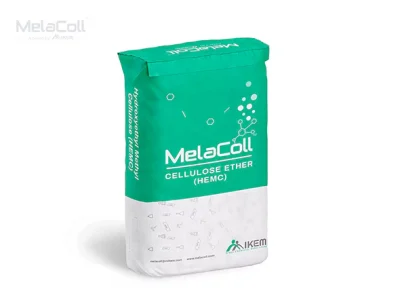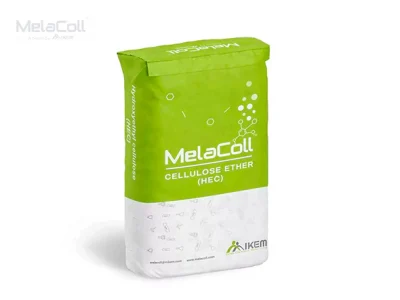
Description:
The best tile adhesives consist of cement, sand, limestone, water, and some performance additives, and are mainly used to bond tile to adhesive. Cellulose ethers (e.g., HPMC, MHEC) and Redispersible Polymer Powder (RDP) are part of the tile adhesives formulation, and they play an essential role in improving product efficiency and performance.
Cement-based tile adhesives are one of the most extensive applications of our MelaColl™ cellulose ethers and Mikrant™ polymer powder. Our products can effectively enhance product adhesion and cohesion, sag resistance, workability, hydrophobicity, and final product consistency.
We also offer tailored formulation to best suit your specific raw materials and special local requirements.
Our products provide the following features in tile adhesive applications:



- Improved sag resistance: The modified MelaColl™ and Mikrant™ can improve sag resistance feature of the adhesives. Better sag resistance means that tile adhensive can be applied more efficiently to walls without sag.
- Improved workability: Better leveling and reduced stickiness of MelaColl™ and Mikrant™ can be applied easily to adhesives, which easy to operate and construction, and can significantly improve the construction efficiency.
- Improved adhesion: MelaColl™ and Mikrant™ have good thickening effect, It can enhance the consistency and bond strength of the Tile adhesives. Suitable addition rate of it makes it has better adhesion feature.
- Improved heat and freeze thaw resistance: After add the MelaColl™ and Mikrant™, the heat and freeze thaw resistance of tile adhesives has improved.
- Improved water retention: MelaColl™ and Mikrant™ substantially reduce the loss of water into absorbing substrates in formulations. The water retention ability of MelaColl also strongly enhances the adhesion strength of wall tile adhesives. This is because the binders have enough time for hydration and at the same time do not lose water.
Recommended MelaColl Grades:
Summary of frequently asked questions
I want to know the formula of tile adhesive.
| Grade | HPMC (kg/mt) | RDP (kg/mt) |
| C1 | 2-2.5 | 15 |
| C2 | 2.5-3 | 30 |
This cement based tile adhesive formula is just a reference.
As the climate and other materials like sand & cement are different in each country, we suggest to adjust it based on actual experiments and guidance from your technical department.
What’s the function of HPMC (HEMC) in tile adhesive?
1. Good workability
2. Extend open time
3. Helps to fully hydrate the cement and increase its strength.
4. Sag resistance
What’s the function of RDP in tile adhesive?
1. In wet mortar: improve the consistency, smoothness, water retention, and workability of mortar.
2. After the adhesive drying: improve adhesion, wear resistance, flexibility, water resistance, deformation, and weatherability, effectively prevent tiles hollowing.
Have you sold it to our country?
As a new brand, Melacoll has clients in the Middle East, South America, North Africa, and South Asia...
Kindly leave your contact information, we will contact you with more details within 12 hours.
I am looking for an agent in my country.
Mikem is developing steadily and quickly. Now we have agents in India, Tunisia, UAE, and Venezuela.
Kindly leave your contact information, our agent will contact you soon.
What are the hazards of tile hollowing?
1. The hollow part of the tile is not sticky, and it is easy to break when the external force is significant in the future.
2. The hollowing area of the tiles may gradually expand, and finally, the tiles will lift or fall off.
3. Hollow tiles will affect installing water heaters, mirrors, pendants, cabinets, and bathroom cabinets... Because it will break while drilling.
4. Hollow tiles will cause water to accumulate on corners, leading to rot and smell. (know more about tile hollowing)
What causes tile hollowing?
1. The base layer is not firm or clean. The tile adhesive did not adhere to the base layer.
2. The adhesive does not cover the entire tile, resulting in a partial gap between the tile and the substrate.
3. There is no gap between the tiles or the gap is too small. When the temperature changes, the tiles squeeze each other, causing bulges or cracking.
4. The temperature during construction is too high or too low, which affects the performance of the tile adhesive. It is generally used at 5-35 °C.
5. There is no compaction during the tile-laying process.
6. Add too much water when mixing the tile adhesive. After the water evaporates, leaving a gap between the base layer and the tile, causing the tile to bulge or fall.
7. Affected by an external force before the tile adhesive is fully cured (usually it takes 1~2 days), such as walking on it, knocking... tiles will loosen and fall off.
What should I pay attention to when laying tiles?
1. Put the water first and then the powder.
2. It is best to use an electric agitator when mixing to have enough blending.
3. The mixing time of the machine should not be less than 2-3min. So that the material can be fully hydrated without agglomeration. After stirring, let it stand for about ten minutes and then stir again before using.
4. Use a toothed scraper to spread the grout evenly on the base layer and form a toothed shape. The thickness is about half the height of the tooth pitch of the scraper.
5. Apply about 1 ㎡ each time, and then lay the tiles within 5-15 minutes. Change needs to be carried out within 20-25 minutes.
6. Choose a suitable tooth scraper according to:
1. The flatness of the base layer.
2. The degree of convexity on the back of the tile.
7. Pay attention to leaving proper gaps between the tiles. It is generally recommended to reserve an expansion joint of 1-3mm.
8. Laying and waiting for the adhesive to harden completely (approximately 24 hours). Then fill the joints; Clean the surface of the tiles with a cloth or a sponge before the grout hardens. If it hardens for more than 24 hours, clean the stains with tile and stone cleaners (do not use acid cleaners).
9. If it is a rainy day, please do waterproof measures to ensure that the tiles will not be exposed to rain within 24 hours.





